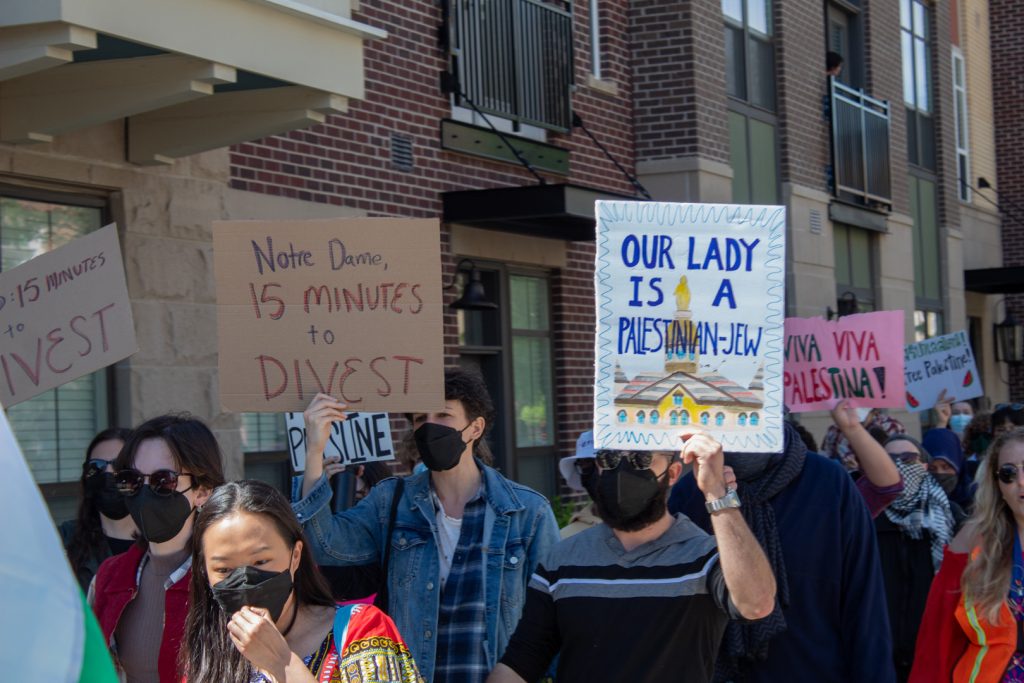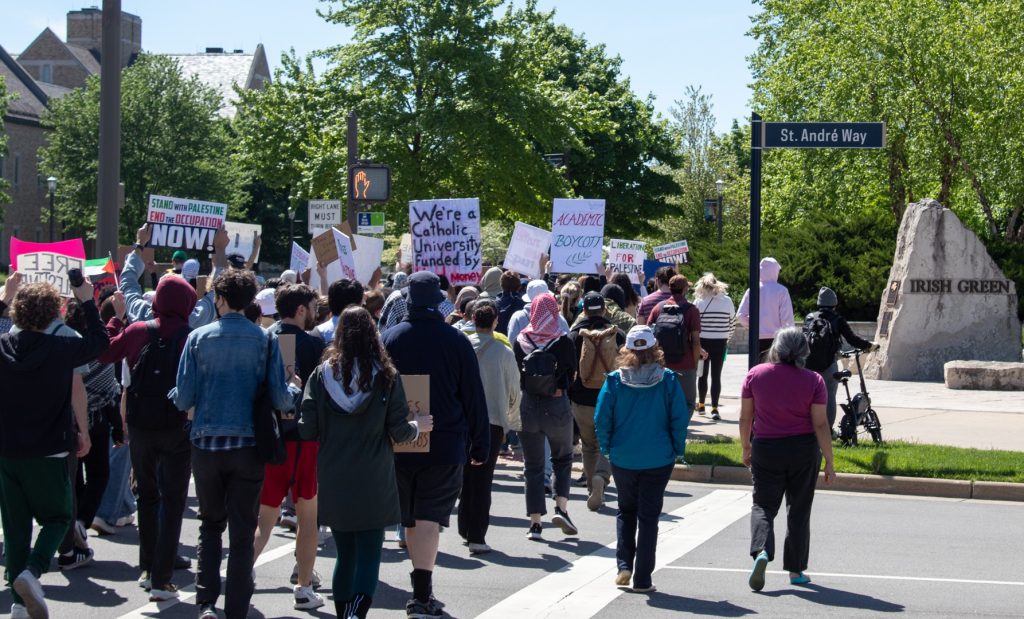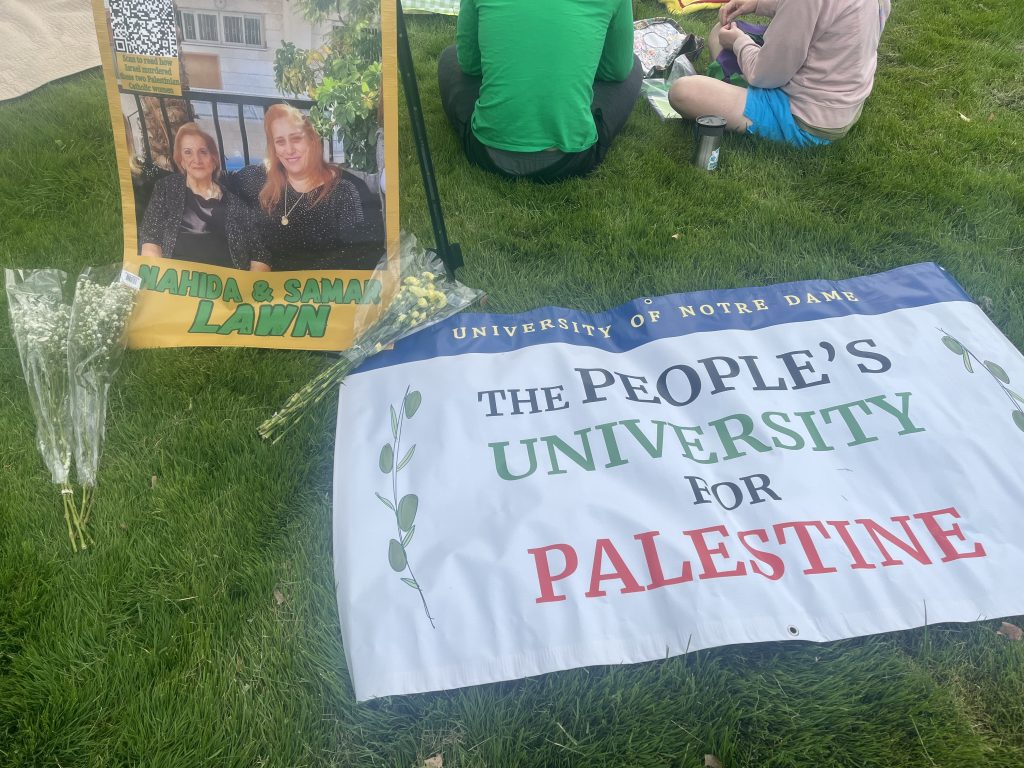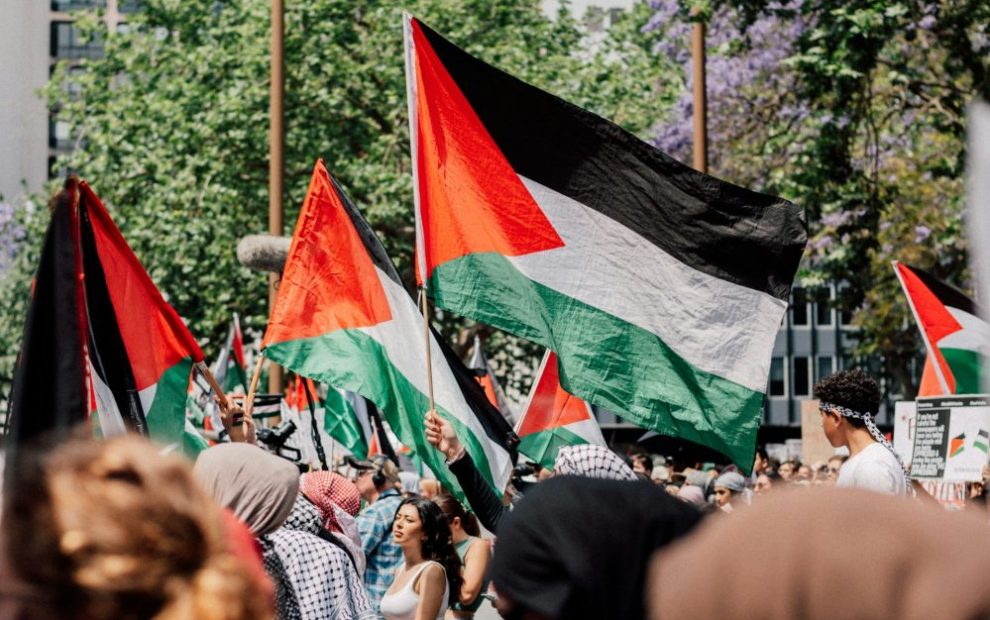On May 2, Notre Dame students gathered on a lawn on the university’s campus to call for a ceasefire in Gaza. Palestinian student Daniel Bannoura publicly renamed the lawn the “Nahida and Samar Lawn,” the names of two Catholic women, a mother and daughter, who were killed by an Israeli sniper in December 2023 near a church where Palestinians were seeking shelter.
Bannoura, a PhD candidate in theology, says he chose that title for the lawn to “emphasize that Catholics suffer from the war, and Catholics have been killed. We are saying, ‘Hey Notre Dame, if you don’t want to divest, how does your Catholic identity form the way that you think about Christians in Gaza? If not all the humans of Gaza, what about the Christians?’”
OccupationFreeND, an interreligious group of Notre Dame students, faculty, and staff members, assembled on May 2 with the other groups on campus calling for a ceasefire. They also asked that the university take economic actions to stop supporting the war and systems of apartheid. That night, university officials called the police, and 17 students and staff members were arrested.
Over the past few months, OccupationFreeND has been organizing university-sanctioned prayer vigils, as well as other forms of mourning and protest, says Flora X. Tang, a theology and peace studies PhD candidate and 2018 undergraduate alumni from Notre Dame. This spring, she says, “as the genocide in Gaza intensified, many of us had a feeling that we can no longer be silent, and because we love this university very much, we want it to do better.”
Since October 7, 2023, when Hamas killed 1,200 Israelis and took more than 240 hostages, Israel’s war on Gaza has killed more than 35,000 Palestinians. According to the United Nations, about 52 percent of those killed have been women and children.
In January, the International Court of Justice ruled that it’s plausible Israel has committed a genocide in Gaza. Meanwhile, the United States has continued to send Israel hundreds of millions of dollars in military aid and weapons since October 2023.
For months, activists have been calling for a ceasefire and for the United States to stop sending military aid to Israel. The continued devastation of the war and U.S. support of Israel is part of what led students at universities across the country to start encampments and protests in April and May 2024. These protests have ended in hundreds of arrests.
Several Catholic colleges, including Fordham, Loyola Chicago, DePaul, and Notre Dame, participated in the protests this spring, some drawing on their schools’ Catholic values to pressure universities to take action. DePaul University’s encampment in Chicago, which was torn down by police on May 16, emphasized through social media posts that the encampment embodied “values and practices that align with the teachings of St. Vincent DePaul.”
Notre Dame’s encampment and protests drew explicitly from Catholic Social Teaching. “We are echoing both Pope Francis’ call for a ceasefire in Gaza as well as our own university president, Father John Jenkins, who in February, after a meeting with Pope Francis, called for a ceasefire,” Tang says. These calls for peace included tangible economic actions that could make a ceasefire possible.
Tang and other students wrote a speech connecting Catholic social teaching and divestment, which they delivered at the protests. In the speech, Tang referenced the U.S. Conference of Catholic Bishops’ (USCB) Socially Responsible Investment Guidelines, Catholic teachings on war, and the seven principles of Catholic Social Teaching to show how “investment in Lockheed Martin, Boeing, Raytheon, Northrop Grumman, General Dynamics, and any other weapons manufacturers perpetuate harm, and thus must be removed from Notre Dame’s investments.” At a minimum, Tang wrote, “our economic investments must not profit from war, destruction, and bloodshed.”

Protesters’ demands
The OccupationFreeND group has three demands: The first is for the university to disclose which companies it invests in and divest from companies that profit from the war in Gaza. Tang says the protesters do not know clearly what Notre Dame’s investments are; this is why they are asking the university to disclose its investments. Bannoura says he’s attempted to speak with Notre Dame’s investment office but has been unable to gather information about the university’s investments. In the past, the school has realigned its investments according to the USCCB’s investment guidelines, which include not allowing its licensed products to be manufactured in countries that do not follow freedom of association rights for workers, such as China. The protesters have reason to believe that Notre Dame invests in or partners with weapons-manufacturing companies, Tang says, one example being the university’s partnership with Lockheed Martin, one of the largest weapons-manufacturing companies.
The second demand is to be engaged in academic boycott: The group is calling for Notre Dame to end its relationships with Tel Aviv University and publicly commit the University of Notre Dame Tantur, their Jerusalem campus, to uplifting Palestinians. Academic boycotts emphasize the ways academic institutions are involved in developing military doctrines and weapons systems, Bannoura says.
Boycott, Divestment, Sanctions (BDS) is a movement that started in 2005 as a call from Palestinians to people around the world to put nonviolent pressure on Israel to end its occupation of Palestine. The movement draws inspiration from the South African anti-apartheid movement.
Throughout the 1970s and ’80s, to protest the racial apartheid system, Notre Dame divested from companies doing business in South Africa. Now, OccupationFreeND is calling on the university to undergo a similar process with weapons manufacturers and Israeli institutions.
The third demand is to repeal the “15-minute rule,” a Notre Dame rule that all protests must be 15 minutes long or protestors risk getting suspended or arrested.
Bannoura hopes Notre Dame will not only heed students’ demands but also think proactively about how the school is supporting Palestinian students and using its Jerusalem campus to “have conversations about faith, ethics, and the public good.”
The arrests happened during a vigil the group was holding outside the basilica. “It was very peaceful,” Tang says. “As one of our students said loudly as he was being arrested, many were arrested following in the witness of Dorothy Day, Gustavo Gutiérrez, Dan Berrigan, and the Catholic peace tradition.”
Alice Lei, an undergraduate sophomore at Notre Dame who is studying political science and peace studies, was one of the students arrested. She got involved in the protests through an activist group on campus called SolidarityND. She spent time in Palestine for two months last summer, which led her to become more involved in the movement.
After coming out of jail the day after the protest, “I wasn’t feeling great at all,” Lei says, “but it helped to see so many people in agreement that this is not how the university should’ve responded. This is not how the university should have treated or handled their students who were peaceful protesters.”
For Bannoura, being part of these protests is a “very personal issue.” He goes on to say, “No matter how I try to escape or not be involved, it always comes back and haunts me—the trauma of growing up under occupation, losing family members and friends, suffering daily from the occupation.” He has lost two friends in Gaza. “The dehumanization of Palestinians and the plausible genocide—this system has been going on for 76 years, and it affects me and millions of Palestinians directly.”
Bannoura, who is Protestant, sees “many Christians, my siblings in the faith, who are happy to justify war and justify supporting Israel at every expense, even at the expense of Palestinians.” At least 3 percent of the Christian population in Gaza has died in the war.
All of this informs Bannoura’s academic work—he hosts a podcast called Across the Divide where he engages in conversations on theology and faith in relation to Palestinians. In late May 2024, he was at Bethlehem Bible College in Palestine speaking about a Christian response to Gaza at a conference called “Christ at the Checkpoint.”
Francesca Freeman, a Notre Dame PhD candidate in peace studies and history who studies American Jewish Zionism and the legacies of the Holocaust, got involved with OccupationFreeND as an extension of her academic work. “I’m atheist, but I grew up practicing [Judaism] in the sense that we went to Shabbat every week and celebrated the holidays,” she says. “There have been a lot of Jewish values that guide my approach to this work: the focus on justice, questioning systems of oppression and power, and community and relationship building that I’ve learned from Jewish teaching and Jewish communities that I’ve been a part of.” Freeman’s Jewish background “has guided my entire life since I was in middle school to work against genocide and systems of oppression that lead to genocide,” she says.

A “long historical lens”
Understanding the Israel/Palestine conflict requires a “long historical lens,” says Atalia Omer, a professor of religion, conflict, and peace studies who is a core faculty member in the peace studies major and minor at Notre Dame. Her primary research is in religion, ethics, and politics, with a particular focus on Palestine and Israel, as well as border regions and violence. She’s written books about the Israeli Peace Camp and Jewish American activists. She is Israeli and teaches classes dedicated to Palestine/Israel.
“You see now, especially after October 7, so many Jewish [ceasefire] protests, not in spite of being Jewish but because of their Jewishness, they are out there,” Omer says. She is interested in what makes younger generations “shift their affective loyalty—the way in which they were taught to not question their support of Israel and even use their Jewishness in support of the nation-state.”
Zionism is “a movement that emerged in Europe in the late 19th century, in the context of nationalism,” Omer says. “Zionism has been a movement for the creation of the Jewish majority, a political project that’s wanted to see itself as a democracy in historic Palestine.”
In 1917, a British law called the Balfour Declaration issued support for the creation of a Jewish nation-state and homeland. “There were people in the land,” Omer says, “and in order to implement that vision, there needed to be a massive ethnic cleansing, which is what happened.” Omer also wants to underscore the role of imperial nations in implementing that vision, first Great Britain and then the United States.
While Zionism has taken many forms, Omer says that “Jewish Zionism is the project to establish and maintain a sovereign Jewish-majority state in Palestine. This political and cultural project relies on a particular reading of Jewish history which uses biblical narratives to interpret the Jews as returning to their ancestral land.”
Jewish Zionism comes in secular and religious versions, “but they both involve a particular narrative of Jewish history and destiny as involving a series of catastrophes from the destruction of the Temples in Jerusalem, through the pogroms and the Holocaust, and finally redemption in Zion,” she says.
Christian Zionism predates Jewish Zionism and also comes in many forms, Omer says. “Christian Zionists have been very influential in facilitating the Jewish Zionist project,” including Lord Balfour, who made the 1917 Balfour Declaration.
“Christian Zionism relies on a particular understanding of the end time,” Omer says. “According to prophecy, ‘the Jews’ need to ‘return’ to the land for the second coming to unfold after a series of tribulations. Ultimately, however, ‘the Jews’ are just instruments for Christian redemption and are to perish according to Christian Zionist theology. I surround ‘the Jews’ with quotes to denote that within a Christian Zionist worldview, they are mere fetish/instruments.” Because of this, Omer says, “Christian Zionism is deeply antisemitic, even though it presents itself as not.”
The United Nations recognized the state of Israel in 1948, and hundreds of thousands of Jews who were persecuted in Europe immigrated there. This was followed by the Arab-Israeli war, or the “war of independence, which is what Palestinians call the nakba, the catastrophe, the initial ethnic cleansing of over 750,000 people which created the first wave of Palestinian refugees,” Omer says. In 1967, a military occupation of the rest of historic Palestine began, which included the West Bank, Gaza, and East Jerusalem.
Antisemitism, which means “targeting Jews as such because they are Jews,” Omer says, has become increasingly conflated, especially since October 7, with anti-Zionism, or “being critical of Israel and being critical of Zionism,” she says.
Omer says that the IHRA (International Holocaust Remembrance Alliance) definition of antisemitism has been promoted in the United States. The IHRA definition includes a series of examples of antisemitism, and “one of the examples listed in the IHRA definition is calling Israel a racist state, which will amount to a form of antisemitism.” She points to 2018, when the Israel parliament passed the “nation-state law” that states that “Israel is a state for Jews and Jews only.”
“This is racist; it privileges one group over another group,” Omer says. In the past few years, “there has been a wave of reports that show how there are two systems: one for Jews, one for non-Jews. B’Tselem, the largest and most respectable Jewish Israeli human rights organization, produced a report called ‘A regime of Jewish supremacy from the Jordan River to the Mediterranean Sea: This is apartheid.’”
At college encampments, Omer has observed that the “very mention of BDS [Boycott, Divestment, and Sanctions] gets translated as antisemitic. Then it shuts down people.” As American citizens, she says, “our tax dollars go into [military aid for Israel]; this is why the students focus on disclosure and divestment.”
What the conflation of antisemitism and anti-Zionism has resulted in, Omer says, is that “somehow all Jews, Jewish history, Jewish meaning, became hegemonic, that Israel speaks in the name of all Jews, that Netanyahu speaks in the name of all Jews.”
Omer says there are many Jewish people, “including Jewish Israelis like me, who are deeply critical of the policies of the political project. There is a lot of discursive violence that weaponizes claims against antisemitism which ultimately does put Jewish people at risk.”
Protesters against the war need to remember not to conflate Jewish people with the actions of Israel. Some harmful results of this have been, for example, incidents of violent rhetoric and targeting of Jewish students that happened during protests at Columbia University.

A Catholic response
At Notre Dame, protesters remain committed to the call for a ceasefire and BDS. Their demands and actions are rooted in the Catholic peace tradition and respect for human dignity. Bannoura, Tang, Freeman, and other students involved with Notre Dame’s protests aim to hold the university to its Catholic values and challenge Catholics to examine their own history of violence.
“As a non-Catholic person and as a historian,” Freeman says, “I’ve watched Catholics be complicit in the Holocaust, and then we see Catholics being complicit in the Rwandan genocide, and then today, this university being complicit in the genocide of Palestinians. It’s very hard to see all of this while also hearing things that I really admire and agree with on Catholic social thought.”
In the 1990s, Marc Ellis, a Jewish liberation theologian, wrote about how in the aftermath of the Holocaust, Western Christian churches developed an unspoken “ecumenical deal” that, Omer says, basically meant that they’ll “support the policies of the Israeli state as part of atoning for the depth of Christian antisemitism that facilitated the genocide and near annihilation of Jews in Christian Europe.”
In the 16 years she’s been at Notre Dame, Omer says she “didn’t see at any point a re-interrogating conversation about the persistence in Catholic discourse of antisemitic or anti-Jewish tropes, motifs, church documents, and so forth. Basically, it’s been a Catholic understanding for so long of that ‘ecumenical [deal]’: What does that atonement look like? Supporting Israel. And again it shows you the conflation between Israel and Jews.”
Catholics must “interrogate the legacies of the Catholic tradition and institution in anti-Jewish violence against Jews,” Omer says. “And especially for Catholics in the West, it’s important [to interrogate] how their positions are informed by orientalism, by Islamophobia, and recognize that Palestinian lives matter.”
Bannoura says he’s observed “guilt about Catholic antisemitism” that, instead of leading to action, has resulted in Catholics being silent and not speaking up for Palestinians. His appeal to Catholics and Christians is to take a moral stance, “thinking about what it means to love my neighbor, to tap into the Catholic tradition of the preferential option for the poor, liberation theology—that God is on the side of the oppressed—to think how that applies to today,” he says.
Since the encampment ended at Notre Dame, the protesters have gained support among students and faculty. Several faculty members have offered to be mediators between the group and administration, Freeman says.
Tang hopes that the witness of the protests will allow her classmates across campus to “soften their hearts and direct their eyes, gaze, attention, and prayers to Gaza or issues of urgent human suffering around the world; for conversions in the hearts of many.”
Students in the OccupationFreeND group will continue to use their “words, prayers, and voices to have the university do the right thing,” Tang says. “Having some of my peers and very dear friends [get] arrested felt really hopeless, but I have the hope that my university has done things for peace and human rights in the past and it could, if it wants, do that again.”
Header Image: Unsplash/ Nikolas Gannon
All Other Images: Courtesy of Flora x. Tang, taken at Notre Dame protests in May 2024















Add comment